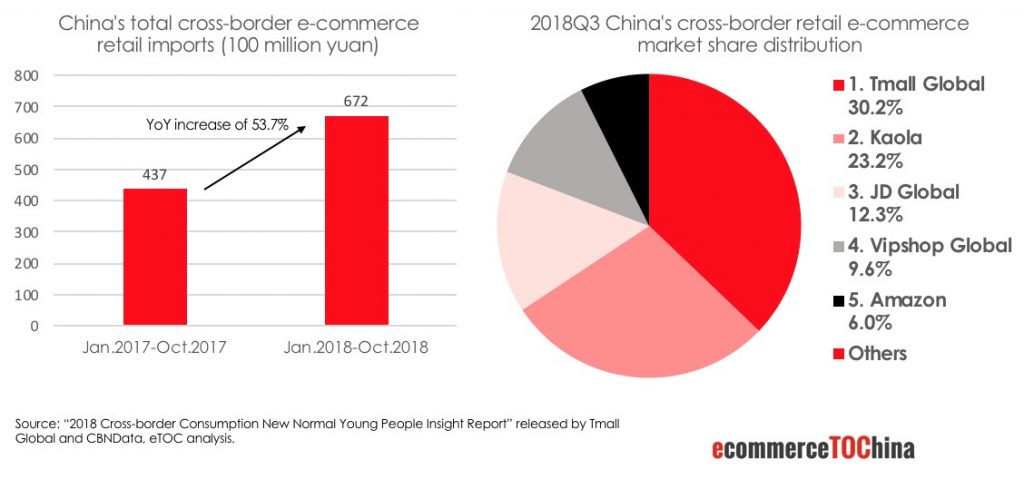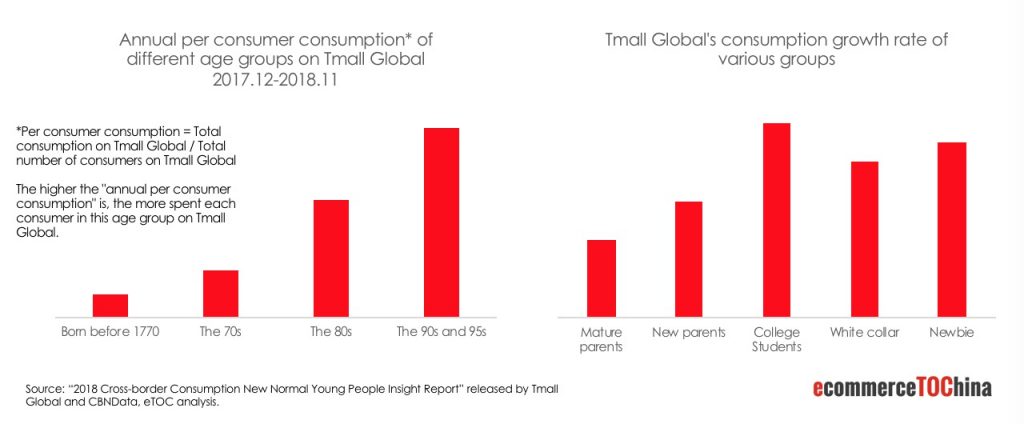
Sell to China via No.1 CBEC platform Tmall Global
With globalization’s prevalence, cross-border consumption has become the new normal of modern life. Due to this year’s epidemic, outbound travel has been blocked, online import consumption has continued to grow, and consumer demand for foreign goods in China has grown significantly. According to Alibaba’s Q1 2020 financial report, Tmall Global’s GMV (excluding unpaid orders) increased by more than 40% year-on-year (source: 36kr).
According to the “2018 Cross-border Consumption New Normal Young People Insight Report” released by Tmall Global and CBNData, China’s total cross-border e-commerce imports increased by 53.7% year-on-year, by October 2018. In the past three years, more and more consumers have chosen Tmall Global for cross-border consumption. Statistics show that since Q3 2018, Tmall Global ranked first in the “Chinese Import Cross-border Retail Market” with a market share of 30.2%, followed by Koala (23.2%) and JD Global (12.3%).
Over the past five years, Tmall Global has evolved into one of the most trusted platforms for Chinese consumers to purchase imported products. This article will introduce the Tmall Global platform from different perspectives to share following useful knowledge:
How to sell to China through cross-border e-commerce?
What is Tmall Global?
How to work with Tmall Global?
Who buys from Tmall Global?
What products do Chinese consumers buy from Tmall Global?
Which countries of origin are preferred by the Chinese consumers?



What is cross-border e-commerce?
Cross-border e-commerce is a newly regulated business model from the Chinese government that allows international companies to sell products directly to the Chinese consumers online, through authorized platforms at preferential duty rates and without a license to operate a business in China. No Chinese legal entity, no product registration, no Chinese labeling needed. Overseas brands can also benefit from favorable policies such as fast lane customs clearances, lower tax rates, and clustering of e-commerce logistics services.
What is Tmall Global?
In February 2014, Alibaba Group launched Tmall Global as a cross-border e-commerce marketplace for foreign brands and merchants to sell directly to Chinese consumers.
Tmall Global has become the largest cross border e-commerce platform in China since 2018. There are over 5,300 product categories of more than 26,000 international brands from 84 countries and regions in Tmall Global. Over the past five years, Tmall Global has developed into one of the most trusted platforms for Chinese consumers to buy imported products.
What are the major business models of Tmall Global?
Tmall Global provides 3 major business models for merchants in China. Depending on the existing brand awareness in China, products and categories, business goals and its development stage, brands can choose different business models or make use of several business models at the same time.
- Tmall overseas fulfillment model (TOF)
For an overseas brand that intends to test the Chinese market but has low brand awareness in China, the TOF model could be the right solution. TOF means a direct import consignment model using Alibaba’s overseas warehouses, ensuring inventory flexibility and low logistic and storage costs for suppliers. TOF helps overseas brands target the growing middle-class consumer base and test the Chinese market for sales potential.
If you choose TOF model, Tmall Global team will assist you in selecting the best-selling items. They are also responsible for selling, branding, and marketing on and off the platform. At the same time, the overseas brands have to ensure the delivery of goods to Alibaba’s overseas warehouses in various regions.
- Tmall direct import model (TDI)
Overseas brands with high brand awareness in China and a willingness to invest in the Chinese market can apply the TDI solution (direct import model-B2B2C). TDI model is a supplier model aiming at brands that have prominent top-selling products. It provides a platform where fast-moving SKUs are sold through the Tmall Global TDI store.
With the TDI model, overseas brands can easily control their supply chain depth and risk by directly collaborating with a powerful Chinese distribution channel Cainiao. TDI Team purchases from brands and suppliers, and the brands and suppliers ship goods to Cainiao bonded warehouses in China. Then the selected products are sold on the official direct import store on Tmall Global.
- Tmall Global flagship store model
The mature overseas brands that want to maintain and engage your customer base in China
with a dedicated CRM program may consider the TMG business model. With the flagship store model, the brand manages its own flagship store on Tmall Global.
In terms of operation, overseas brands should follow a tentative timeframe. At the preparation stage, you should provide the TMG team with brand and product information, find a TP (shop operation partner), and develop a detailed plan with your TP. Then you can submit a store application and your brand qualifications. At the same time, you can start to register an Alipay account and a Taobao account. After receiving a store invitation and signing a contract with Cainiao, you can begin designing the store, uploading products, and shipping your goods to the warehouse. Having followed the above steps, foreign brands can officially sell products in the their own Tmall Global flagship store and continuously optimize their performance.



Who is shopping on Tmall Global?
According to Tmall Global “2018 Cross-border Consumption New Normal Young People Insight Report”, the “main force” in cross-border consumption is the post-90/95 generation group. Their annual average consumption per person has surpassed that of the post-80 generation. According to statistics, by the end of the third quarter of 2017, the post-90/95 generation contributed more than 30% of Tmall Global sales. The new generations are interested in new things, especially international culture. They are willing to try different products and have more diversified needs in their daily lives. Moreover, the categories of overseas products they buy are also increasing year by year. Among them, college students are prominent representatives. This group of people ranks first in the “growth rate of cross-border consumption”.



What products do the Chinese consumers buy on Tmall Global?
The report shows that “beauty and skincare” has become a fundamental category of consumption on Tmall Global of the post-90/95 generations in the past year. Different forms of facial masks are the most popular products, and anti hair loss shampoos are selling well. The consumption of oral beauty products is also rising, and oral hyaluronic acid is wildly popular among the post-90/95 consumers.
Another preferred category is household goods. The post-90/95 generation pursues quality of life. Multifunctional smart home appliances and well-designed light luxury furniture are all products they buy in large quantities on the Tmall Global platform. For example, chandeliers, duvets, teapots.
Green, low-fat, no-added healthy overseas snacks are also popular among the post-90/95s, such as organic oatmeal. In addition, more and more post-90/95 generations like to buy food, toys, or health supplement for their pets on Tmall Global.
Overseas trendy brand fashion clothing is also one of the motivations for the younger generation to consume on Tmall Global.
Which countries are preferred by the Chinese consumers?
Japan, South Korea, and the United States have always been the top 3 brand countries most favored by Tmall Global consumers from 2015 to 2018. Australia, France, Germany, the United Kingdom, Spain, Italy, and Thailand among the top 10. Beyond that, the sales of Spanish products have grown prominently rapidly.
Different countries have different advantageous products. Japan’s preferred product categories are electronic beauty equipment, facial masks, and video games. European brands are well-known for skincare, perfume, and clothing products. For Thailand, the specialty is bird’s nest soup.



Tmall Global Cross border e-commerce sounds like a great opportunity to enter into the Chinese market, doesn’t it?
If you are interested in the Chinese market und wonder if you can list your products on Tmall Global to sell directly to the Chinese consumers, you can read more on our blog article “China Market Entry Guide 2020: How to Speed Test Your Product Potential in China”
Or contact us for a first free consultation regarding China-market-entry.
Want to have a first free consultation session about China market entry via e-commerce? Contact us.
